W ith its impressive calcium credentials, cheese has in the past been hailed as an important part of our diets. But a campaign by the Food Standards Agency in February highlighted the yellow stuff as one of the highest contributors of saturated fat to the diet. In order to ensure that cheese is still viewed in a positive light, retailers need to act fast and consider the healthier options on the market, from reduced fat cheeses to smaller portions.
Dairy Crest has thrown itself into promoting its Cathedral City Mature Lighter. Marketing director Paul Fraser says: "Cathedral City Mature Lighter is a good choice for consumers seeking to lower the levels of saturated fat in their diet while still enjoying great taste."
North Downs Dairy has also acknowledged the importance of offering healthier options within its Pilgrims Choice range. The company took to the streets to offer the public samples of its new Pilgrim's Choice Mini Portions, which have now been tried by four million consumers, with a further 10 million taster samples due to be consumed during 2009.
Pilgrim's Choice has seen huge growth - up 59% year on year - and marketing manager Hannah Fordred is confident that consumers will want to buy into controlled portions. "Mini Portions tap into the growing consumer trend for a nutritional eat as a 20g portion of Pilgrim's Choice Cheddar contains important vitamins A, B and D alongside calcium and protein," she says.
Kraft Foods has already witnessed the benefits of providing consumers with portion-controlled cheese. "Kraft Foods' research has shown that increasing numbers of consumers want a snack that is tasty and filling, yet at the same time lower in fat and calorie content than traditional snacking options," says convenience sales director Jack Pipe. "Women tell us their ideal snacks are portion-controlled and individually packed just for them."
Bel UK has also recognised the value of managed portions. "Laughing Cow had an exceptional 2008 because the heartland of the brand is in the Light and Extra Light lines and is portion-controlled, which encourages sensible eating," says head of category management Jean-Paul Pelaez.
Pelaez also notes that some consumers will only deem cheese to be healthy if it's natural. "It's important to make the most of all the macro trends in the market. With the health trend, we're well positioned to persuade consumers that cheese can be part of a balanced diet. Processed cheese will be challenged. That's why it's really important for us to promote Mini Babybel's natural credentials."
Emmi UK also sees natural cheese as the way forward. "Our cheeses are 100% natural - free from colours, additives and preservatives," says managing director Julie Plant. "All of our research shows that consumers are seeking out natural products."
Kerry Foods' Cheestrings have followed suit with a 'natural' makeover, which the firm believes will appeal to both adults and children. "The relaunch is exciting news for Cheestrings and we are confident that it will strengthen our number one position in the cheese snacks category," says senior brands manager Liz Park. "This is the first time in 12 years that we have gone out to consumers with the 'all natural' message and we hope that by educating children in a fun and engaging way, parents will be reassured by the fact that Cheestrings are made from 100% real cheese."
Once the barrier of healthy perceptions has been overcome, the next challenge for cheese is to make it more convenient.
Emmi's range of Swiss cheeses - Emmentaler, le Gruyere and Appenzeller - are available in both block and slice format and have been revamped with reclosable packaging. "The slices give busy consumers maximum convenience, making them ideal for sandwich making," says Plant.
But not everyone believes that slices are the format of the future. "There's a real barrier with sliced - people still think burgers," says Wyke Farms managing director Richard Clothier. "I think grated will become the main convenience format."
Convenience is key
Clothier may have reservations when it comes to processed
cheese, but sales figures tell a different story, with sliced cheese spend up 4.6% to £6,957,000 year on year within the convenience sector (TNS 52 weeks ending March 22, 2009).
However, when it comes to packaging, Wyke is in agreement with Emmi that resealable formats are in demand. The firm is launching Leskol half fat in a zip pack as well as its standard block and grated Cheddars.
Clothier claims that grated cheese in reclosable packaging is a winning formula. "The average meal preparation time has reduced to 11 minutes. As the convenience market continues to grow, there is a genuine requirement for time-saving formats such as grated cheese and resealable packaging," he says. "This new line demonstrates our dedication to making the consumer experience as modern and effortless as possible without sacrificing the strong, traditional Cheddar flavour."
North Downs Dairy is also an advocate of reclosable packaging. Managing director Mike Davies says: "We have taken our Pilgrims Choice packaging to the next level with new reclosable stay-fresh packs. The new packs have been developed after we conducted a major research programme which highlighted that consumers wanted and preferred reclosable packaging above all other packaging formats."
Fordred adds: "We invested more than £1m in new packaging machines as our research showed consumers really liked the reclosable zip."
In the UK, the whole of the Pilgrim's Choice Cheddar range is available in 400g reclosable stay-fresh packs.
But while the big boys are in favour of this ultra-convenient packaging format, one cheese supplier would rather keep things simple. "At the moment there are a lot of brands charging the earth for fancy packaging," says Chris Chisnall, sales and marketing director at Bradbury and Son, which produces the Monterey Jack 1840 brand as well as British regional and continental cheeses. "Consumers are becoming savvy to brand premiums. Rather than taking a huge margin and creating a 'brand tax', we'd prefer to price-promote products in-store to drive volume."
He claims that many of the major brands have got carried away with extortionate premiums. "Over the past 15 years, brands have been used as cash cows to advertise on TV and create a brand image, but at the same time they've taken their prices out of the market," he says.
"If you look at 200g of own label versus some branded products, you'd probably be paying a 10-20% premium when the taste isn't vastly different. People want value for money and that's what we're aiming to provide."
Flavour fix
Walk into any c-store and you can pretty much guarantee you'll find mild and mature Cheddars, but a number of suppliers believe that there are big opportunities in something a little more unusual.
"Consumers are becoming increasingly better educated about and adventurous with the products they consume," says Brian Beattie, head of marketing at Dale Farm. The company produces mature, vintage and red Cheddars and claims that consumers need more flavoursome offerings. "We have seen shifts in the past few years towards stronger-strength cheeses," he says.
Wyke Farms has also witnessed the trend towards cheese with a bit more bite. "We've seen a movement into stronger flavours and part of that is related to the health movement, as less is needed for the same flavour," says Clothier. The company recently launched its Ivy's Vintage Reserve, which pays homage to company founder Ivy Clothier.
Fordred at North Downs Dairy also advises retailers to consider stocking more mature options. "Stronger flavours are certainly popular - the mature cheese category is growing," she says.
And if you are planning to branch out into more flavoursome cheeses, then why stop at Cheddar? "Convenience stores are still playing things very safe, sticking to traditional British favourites such as Cheddar that are an easy, but very basic choice for the consumer," says Emmi's Plant.
"Consumer tastes, particularly in urban centres, are much more orientated towards the gourmet end of the market, and continental cheeses enjoy good sales figures where listed. The British public now deserves more credit for an increased sense of adventure in both their eating and cooking habits."
Though it may seem unlikely, the economic climate is actually driving the continental cheese market forward, she claims. "With increased numbers of consumers staying in during the evenings and cooking from scratch, there is a tendency to purchase higher-quality ingredients and spoil oneself more than usual.
"There seems to be a philosophy of indulgence in sourcing ingredients, perhaps to compensate for the fact that these individuals are not eating out - the aim being to treat yourself at home instead. Le Gruyere is our best-seller in this category and is a long-standing favourite for cooking, as it melts beautifully."
Sales of prepacked continental cheese are up 4.5% in volume, she adds.
French cheese firm Isigny Sainte-Mère agrees that retailers are missing out by failing to stock enough foreign cheese.
"There is certainly a sales opportunity at the premium end of the cheese category because there is a definite shift towards better-quality products," says Stéphane Plessis, European export manager.
"The economic downturn is having a significant impact on consumer habits, with the result that a growing number of consumers are cooking at home instead of going out to eat at a restaurant."
He also notes that there is a need for quality ingredients, enabling consumers to recreate the dishes they eat in restaurants. "This trend will gather pace over the next year or so as the economic downturn continues to hit leisure spending," he says.
Even if your current customers aren't demanding more premium, speciality cheeses, Plessis states that this could well be a way to add incremental sales to the category. "There is certainly an opportunity for some convenience retailers to 'premiumise' their range by offering shoppers an enhanced offering of brands which will encourage their shoppers to trade up more frequently when they buy cheese."
Bradbury and Son's Chisnall also notes that people may well be looking for a speciality cheese, but they end up cooking with Cheddar because it's all that's available. "Consumers may be looking for a grated or shaved parmesan - it's a key cooking ingredient - but they have to make do with Cheddar on their pasta because that's all they can find."
So retailers take note. It's time to take a risk and offer consumers more choice, both in terms of healthier options and also more flavoursome Cheddars and speciality cheeses.
"Consumers are a lot more knowledgeable about cheese than they were a few years ago, so retailers need to stock larger, more diverse ranges at accessible prices," points out Chisnall.
Dairy Crest has thrown itself into promoting its Cathedral City Mature Lighter. Marketing director Paul Fraser says: "Cathedral City Mature Lighter is a good choice for consumers seeking to lower the levels of saturated fat in their diet while still enjoying great taste."
North Downs Dairy has also acknowledged the importance of offering healthier options within its Pilgrims Choice range. The company took to the streets to offer the public samples of its new Pilgrim's Choice Mini Portions, which have now been tried by four million consumers, with a further 10 million taster samples due to be consumed during 2009.
Pilgrim's Choice has seen huge growth - up 59% year on year - and marketing manager Hannah Fordred is confident that consumers will want to buy into controlled portions. "Mini Portions tap into the growing consumer trend for a nutritional eat as a 20g portion of Pilgrim's Choice Cheddar contains important vitamins A, B and D alongside calcium and protein," she says.
Kraft Foods has already witnessed the benefits of providing consumers with portion-controlled cheese. "Kraft Foods' research has shown that increasing numbers of consumers want a snack that is tasty and filling, yet at the same time lower in fat and calorie content than traditional snacking options," says convenience sales director Jack Pipe. "Women tell us their ideal snacks are portion-controlled and individually packed just for them."
Bel UK has also recognised the value of managed portions. "Laughing Cow had an exceptional 2008 because the heartland of the brand is in the Light and Extra Light lines and is portion-controlled, which encourages sensible eating," says head of category management Jean-Paul Pelaez.
Pelaez also notes that some consumers will only deem cheese to be healthy if it's natural. "It's important to make the most of all the macro trends in the market. With the health trend, we're well positioned to persuade consumers that cheese can be part of a balanced diet. Processed cheese will be challenged. That's why it's really important for us to promote Mini Babybel's natural credentials."
Emmi UK also sees natural cheese as the way forward. "Our cheeses are 100% natural - free from colours, additives and preservatives," says managing director Julie Plant. "All of our research shows that consumers are seeking out natural products."
Kerry Foods' Cheestrings have followed suit with a 'natural' makeover, which the firm believes will appeal to both adults and children. "The relaunch is exciting news for Cheestrings and we are confident that it will strengthen our number one position in the cheese snacks category," says senior brands manager Liz Park. "This is the first time in 12 years that we have gone out to consumers with the 'all natural' message and we hope that by educating children in a fun and engaging way, parents will be reassured by the fact that Cheestrings are made from 100% real cheese."
Once the barrier of healthy perceptions has been overcome, the next challenge for cheese is to make it more convenient.
Emmi's range of Swiss cheeses - Emmentaler, le Gruyere and Appenzeller - are available in both block and slice format and have been revamped with reclosable packaging. "The slices give busy consumers maximum convenience, making them ideal for sandwich making," says Plant.
But not everyone believes that slices are the format of the future. "There's a real barrier with sliced - people still think burgers," says Wyke Farms managing director Richard Clothier. "I think grated will become the main convenience format."
Convenience is key
Clothier may have reservations when it comes to processed
cheese, but sales figures tell a different story, with sliced cheese spend up 4.6% to £6,957,000 year on year within the convenience sector (TNS 52 weeks ending March 22, 2009).
However, when it comes to packaging, Wyke is in agreement with Emmi that resealable formats are in demand. The firm is launching Leskol half fat in a zip pack as well as its standard block and grated Cheddars.
Clothier claims that grated cheese in reclosable packaging is a winning formula. "The average meal preparation time has reduced to 11 minutes. As the convenience market continues to grow, there is a genuine requirement for time-saving formats such as grated cheese and resealable packaging," he says. "This new line demonstrates our dedication to making the consumer experience as modern and effortless as possible without sacrificing the strong, traditional Cheddar flavour."
North Downs Dairy is also an advocate of reclosable packaging. Managing director Mike Davies says: "We have taken our Pilgrims Choice packaging to the next level with new reclosable stay-fresh packs. The new packs have been developed after we conducted a major research programme which highlighted that consumers wanted and preferred reclosable packaging above all other packaging formats."
Fordred adds: "We invested more than £1m in new packaging machines as our research showed consumers really liked the reclosable zip."
In the UK, the whole of the Pilgrim's Choice Cheddar range is available in 400g reclosable stay-fresh packs.
But while the big boys are in favour of this ultra-convenient packaging format, one cheese supplier would rather keep things simple. "At the moment there are a lot of brands charging the earth for fancy packaging," says Chris Chisnall, sales and marketing director at Bradbury and Son, which produces the Monterey Jack 1840 brand as well as British regional and continental cheeses. "Consumers are becoming savvy to brand premiums. Rather than taking a huge margin and creating a 'brand tax', we'd prefer to price-promote products in-store to drive volume."
He claims that many of the major brands have got carried away with extortionate premiums. "Over the past 15 years, brands have been used as cash cows to advertise on TV and create a brand image, but at the same time they've taken their prices out of the market," he says.
"If you look at 200g of own label versus some branded products, you'd probably be paying a 10-20% premium when the taste isn't vastly different. People want value for money and that's what we're aiming to provide."
Flavour fix
Walk into any c-store and you can pretty much guarantee you'll find mild and mature Cheddars, but a number of suppliers believe that there are big opportunities in something a little more unusual.
"Consumers are becoming increasingly better educated about and adventurous with the products they consume," says Brian Beattie, head of marketing at Dale Farm. The company produces mature, vintage and red Cheddars and claims that consumers need more flavoursome offerings. "We have seen shifts in the past few years towards stronger-strength cheeses," he says.
Wyke Farms has also witnessed the trend towards cheese with a bit more bite. "We've seen a movement into stronger flavours and part of that is related to the health movement, as less is needed for the same flavour," says Clothier. The company recently launched its Ivy's Vintage Reserve, which pays homage to company founder Ivy Clothier.
Fordred at North Downs Dairy also advises retailers to consider stocking more mature options. "Stronger flavours are certainly popular - the mature cheese category is growing," she says.
And if you are planning to branch out into more flavoursome cheeses, then why stop at Cheddar? "Convenience stores are still playing things very safe, sticking to traditional British favourites such as Cheddar that are an easy, but very basic choice for the consumer," says Emmi's Plant.
"Consumer tastes, particularly in urban centres, are much more orientated towards the gourmet end of the market, and continental cheeses enjoy good sales figures where listed. The British public now deserves more credit for an increased sense of adventure in both their eating and cooking habits."
Though it may seem unlikely, the economic climate is actually driving the continental cheese market forward, she claims. "With increased numbers of consumers staying in during the evenings and cooking from scratch, there is a tendency to purchase higher-quality ingredients and spoil oneself more than usual.
"There seems to be a philosophy of indulgence in sourcing ingredients, perhaps to compensate for the fact that these individuals are not eating out - the aim being to treat yourself at home instead. Le Gruyere is our best-seller in this category and is a long-standing favourite for cooking, as it melts beautifully."
Sales of prepacked continental cheese are up 4.5% in volume, she adds.
French cheese firm Isigny Sainte-Mère agrees that retailers are missing out by failing to stock enough foreign cheese.
"There is certainly a sales opportunity at the premium end of the cheese category because there is a definite shift towards better-quality products," says Stéphane Plessis, European export manager.
"The economic downturn is having a significant impact on consumer habits, with the result that a growing number of consumers are cooking at home instead of going out to eat at a restaurant."
He also notes that there is a need for quality ingredients, enabling consumers to recreate the dishes they eat in restaurants. "This trend will gather pace over the next year or so as the economic downturn continues to hit leisure spending," he says.
Even if your current customers aren't demanding more premium, speciality cheeses, Plessis states that this could well be a way to add incremental sales to the category. "There is certainly an opportunity for some convenience retailers to 'premiumise' their range by offering shoppers an enhanced offering of brands which will encourage their shoppers to trade up more frequently when they buy cheese."
Bradbury and Son's Chisnall also notes that people may well be looking for a speciality cheese, but they end up cooking with Cheddar because it's all that's available. "Consumers may be looking for a grated or shaved parmesan - it's a key cooking ingredient - but they have to make do with Cheddar on their pasta because that's all they can find."
So retailers take note. It's time to take a risk and offer consumers more choice, both in terms of healthier options and also more flavoursome Cheddars and speciality cheeses.
"Consumers are a lot more knowledgeable about cheese than they were a few years ago, so retailers need to stock larger, more diverse ranges at accessible prices," points out Chisnall.
Waxing or waning
The edam market is in sharp decline, according cheese distributor Bradbury & Son, but the company plans to turn things around.
"About 10 years ago 12,000 tonnes of edam was sold a year in the UK. Now it's only 4,000," says sales and marketing director Chris Chisnall. "The wax ball makes edam stand out, but it's more difficult to slice, grate and cut. Consumers are used to products that are more versatile."
He also claims that edam wax balls are too expensive. "The real nail in the coffin for the wax ball is that inflation means it has moved into the speciality cheeses price range when it used to be alongside mild Cheddar."
Bradbury and Son plans to increase sales by selling edam in blocks, at a cheaper price than waxed balls. "A block of edam is much cheaper to make than the wax ball, so the price of our Go Dutch edam is much more in line with Cheddar - 200g packs will sell at £1," he says. "There's also 20% less waste without the wax, a fact that can be shouted about on shelf borders."
However, the edam wax ball is not going anywhere without a fight and Friesland Foods - the Dutch co-operative behind the EdamMade campaign - is determined to make the cheese a staple line within c-stores.
Friesland Foods marketing manager Elien Zwart-Dijkstra says: "The challenge for us is reaching those consumers who remember edam from their childhood but have since lost touch with the product. By communicating the unique heritage of Dutch Edam, along with its health credentials and taste, we hope to encourage consumers to reintroduce it."
The edam market is in sharp decline, according cheese distributor Bradbury & Son, but the company plans to turn things around.
"About 10 years ago 12,000 tonnes of edam was sold a year in the UK. Now it's only 4,000," says sales and marketing director Chris Chisnall. "The wax ball makes edam stand out, but it's more difficult to slice, grate and cut. Consumers are used to products that are more versatile."
He also claims that edam wax balls are too expensive. "The real nail in the coffin for the wax ball is that inflation means it has moved into the speciality cheeses price range when it used to be alongside mild Cheddar."
Bradbury and Son plans to increase sales by selling edam in blocks, at a cheaper price than waxed balls. "A block of edam is much cheaper to make than the wax ball, so the price of our Go Dutch edam is much more in line with Cheddar - 200g packs will sell at £1," he says. "There's also 20% less waste without the wax, a fact that can be shouted about on shelf borders."
However, the edam wax ball is not going anywhere without a fight and Friesland Foods - the Dutch co-operative behind the EdamMade campaign - is determined to make the cheese a staple line within c-stores.
Friesland Foods marketing manager Elien Zwart-Dijkstra says: "The challenge for us is reaching those consumers who remember edam from their childhood but have since lost touch with the product. By communicating the unique heritage of Dutch Edam, along with its health credentials and taste, we hope to encourage consumers to reintroduce it."
retailer opinion
"We've seen fairly steady cheese sales over the past few months. We sell loose cheese, as well as packaged own label and branded produce.
"The loose product is popular with elderly customers, whereas younger people like the convenience of the packaged cheeses. Over the years I've tried to introduce a variety of different products, but the core range I stock is mature and mild Cheddar, red Leicester and double Gloucester. In packaged cheese, I have Cathedral City mature cheddar, Wyke Farms Wensleydale and Londis extra mature and vintage Cheddars.
"Mature Cheddar is our biggest seller by a mile - I think people just prefer the strong flavour.
"Laughing Cow is on our shelves from time to time, but our main cheese triangles are Dairylea, which sell well - I expect this is mainly bought for kids.
"I don't stock any continental cheeses, but it is an area I would look into if I had more space."
Roger Atfield, Central Stores, Cumbria
"We've seen fairly steady cheese sales over the past few months. We sell loose cheese, as well as packaged own label and branded produce.
"The loose product is popular with elderly customers, whereas younger people like the convenience of the packaged cheeses. Over the years I've tried to introduce a variety of different products, but the core range I stock is mature and mild Cheddar, red Leicester and double Gloucester. In packaged cheese, I have Cathedral City mature cheddar, Wyke Farms Wensleydale and Londis extra mature and vintage Cheddars.
"Mature Cheddar is our biggest seller by a mile - I think people just prefer the strong flavour.
"Laughing Cow is on our shelves from time to time, but our main cheese triangles are Dairylea, which sell well - I expect this is mainly bought for kids.
"I don't stock any continental cheeses, but it is an area I would look into if I had more space."
Roger Atfield, Central Stores, Cumbria
top tips
Keeping a cheese fixture regularly stocked, replenished and visible is essential to ensure convenience stores drive footfall and compete in what is a highly competitive environment. Wherever possible, brand block and make sure clear segmentation and sufficient space is given to key segments such as everyday block, sliced & grated and snacking (kids and adult).
Availability - must be 100%, particularly when customer demand is highest. Research shows that if a product is unavailable twice in a row then shoppers will look elsewhere - permanently
Cleanliness - keep your chiller and cheese segment spotless. Chilled is the hygiene benchmark for your store
Rotation - always rotate date codes and pull old stock forward
Out-of-date stock - don't mark down, it gives the wrong impression. Clear to waste
Sales peaks - understand your sales peaks and replenish the range regularly
Help customers shop - keep your range, segmentation and fixture communication simple
Visibility - any offers should be visible and clearly explained.
Source: Dairy Crest
Keeping a cheese fixture regularly stocked, replenished and visible is essential to ensure convenience stores drive footfall and compete in what is a highly competitive environment. Wherever possible, brand block and make sure clear segmentation and sufficient space is given to key segments such as everyday block, sliced & grated and snacking (kids and adult).
Availability - must be 100%, particularly when customer demand is highest. Research shows that if a product is unavailable twice in a row then shoppers will look elsewhere - permanently
Cleanliness - keep your chiller and cheese segment spotless. Chilled is the hygiene benchmark for your store
Rotation - always rotate date codes and pull old stock forward
Out-of-date stock - don't mark down, it gives the wrong impression. Clear to waste
Sales peaks - understand your sales peaks and replenish the range regularly
Help customers shop - keep your range, segmentation and fixture communication simple
Visibility - any offers should be visible and clearly explained.
Source: Dairy Crest
ones to watch...
Fill up on Phily
Kraft Foods is pumping £5.5m into marketing Philadelphia's packaging makeover. The product's redesigned lid, which keeps the product fresh for longer, will be highlighted in two TV campaigns.
rrp: 125g pack £1.15
tel: 01242 236 101
Boursin's back
After its burst over March and April, Bel UK's Boursin will hit TV screens again in July and August. The humorous adverts use the brand's well-known 'du pain, du vin, du Boursin' tagline.
rrp: garlic & herb 80g £1.29; 150g £1.98
tel: 01622 774 800
History channel
Wyke Farms has launched a print media and TV campaign to highlight the provenance, quality and traditional values behind the cheese brand. The TV advert tells the story of company founder Ivy Clothier.
tel: 01749 813 614
All smiles
Giggles tooth-friendly soft cheese is making a name for itself alongside Laughing Cow as part of Bel UK's new advertising campaign. The 90g Giggles packs are expected to appeal to both mothers and children alike.
rrp: 99p
tel: 01622 774 800
Having a ball
Friesland Foods will be drawing on Dutch Edam's health credentials to promote wax balls, wedges and slices as part of its Edam campaign. The cheeses are made with 25% less fat than Cheddar.
rrp: wedge 230g £1.40
Tel: 020 7053 6000
Fill up on Phily
Kraft Foods is pumping £5.5m into marketing Philadelphia's packaging makeover. The product's redesigned lid, which keeps the product fresh for longer, will be highlighted in two TV campaigns.
rrp: 125g pack £1.15
tel: 01242 236 101
Boursin's back
After its burst over March and April, Bel UK's Boursin will hit TV screens again in July and August. The humorous adverts use the brand's well-known 'du pain, du vin, du Boursin' tagline.
rrp: garlic & herb 80g £1.29; 150g £1.98
tel: 01622 774 800
History channel
Wyke Farms has launched a print media and TV campaign to highlight the provenance, quality and traditional values behind the cheese brand. The TV advert tells the story of company founder Ivy Clothier.
tel: 01749 813 614
All smiles
Giggles tooth-friendly soft cheese is making a name for itself alongside Laughing Cow as part of Bel UK's new advertising campaign. The 90g Giggles packs are expected to appeal to both mothers and children alike.
rrp: 99p
tel: 01622 774 800
Having a ball
Friesland Foods will be drawing on Dutch Edam's health credentials to promote wax balls, wedges and slices as part of its Edam campaign. The cheeses are made with 25% less fat than Cheddar.
rrp: wedge 230g £1.40
Tel: 020 7053 6000

















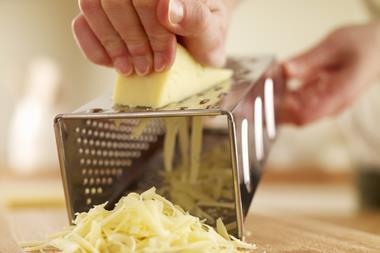
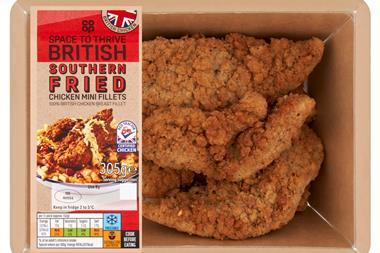


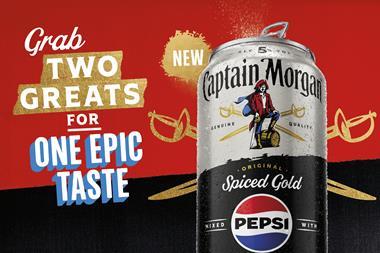
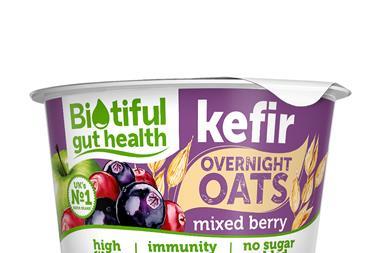
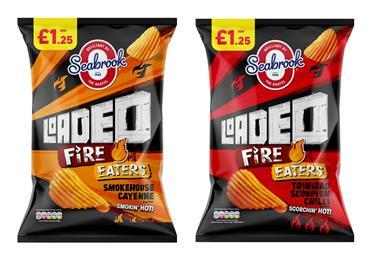
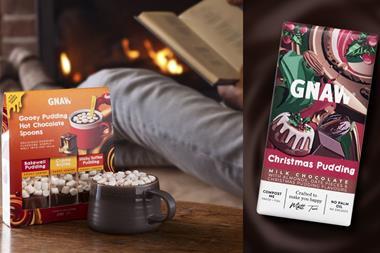
No comments yet